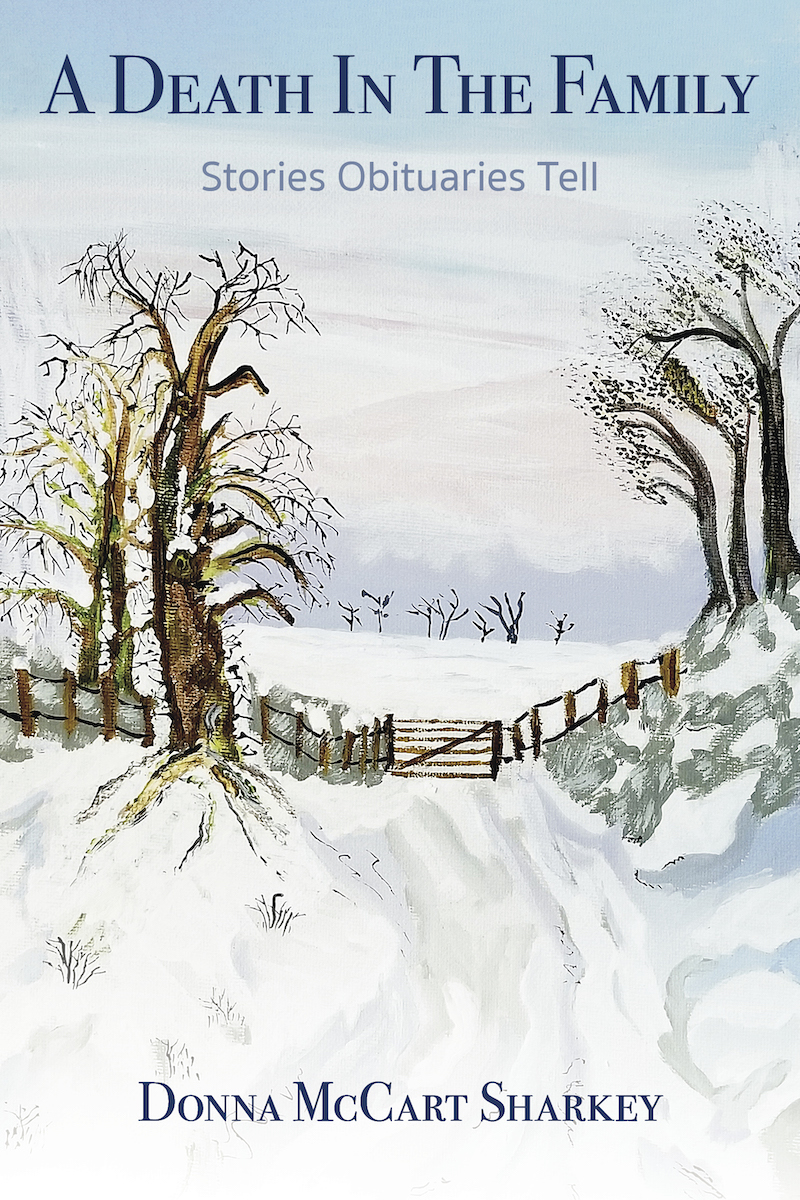
Price: $29.95
Page Count: 148
Publication Date: December 2023
ISBN: 978-1-77258-465-3
Donna McCart Sharkey’s A Death in the Family: Stories Obituaries Tell explores and celebrates the nuanced meaning of obituaries, drawing readers into intricate tales that reveal as much about life as they do about death. Shortly after losing her adult daughter, Sharkey developed a daily ritual of reading newspaper death notices in search of information about other young adults who had died. With frank self-reflection and an open curiosity, the author reflects on her own experiences and observations of life and of death. Sharkey invites readers to confront their mortality and consider their legacy, while honouring the lives of those who have passed on. Ultimately, the book reminds us that we are not alone; that “there is never a day without deaths.” Each “obit” holds a story, as Sharkey articulates, and obituarists are often grieving family members who are untrained, or perhaps somewhat unwilling to reduce a loved one’s life to a few penned words, while caught up in the fog of confronting loss. Some autobiographers opt to write their own obituary, providing us with “notes on living and dying free from regrets.” Obituaries for children “resist an urge to focus on what won’t be.” Some obits are long-winded and memorialize the lost loved one with grand stories, detailing many distinct eras of one’s life, contributions, and experiences. Others are succinct. Some include pictures. The writings are varied in their functions: they summarize milestones in one’s life, name those left behind, dance around the truth, mention beloved pets, reveal or conceal, promote causes, explore worldviews, talk about health, give meaning to vocation, call for celebration or remembrance, and Ultimately, the book reminds us that we are not alone. express gratitude. Through a careful exploration of the seemingly mundane memorials that Sharkey expertly groups into themes, the book becomes a collection of short stories. Together, they coalesce into a grander narrative reflecting the inevitable journey towards death that prompts us to interrogate existential questions about purpose and legacy. Sharkey challenges us to see obits as more than mere death announcements. They can also be profound narratives that reflect the complex human condition: a poignant reminder of both the richness and the fragility of life.
- Kathryn Bell
‘Years ago he wrote “no death notice.” This is a life notice.’ To me, this shortest of obits perfectly captures the spirit of A Death in the Family: Stories Obits tell. Because this book is not about death, not really. It is mostly about life and the meaning of life, from the perspective of the deceased and that of those left behind. While some obituaries poignantly emphasize what mattered most to the departed (The best surprise of my life was the reunion with my son, who I gave up for adoption many years ago and who called my brother in British Columbia), others highlight with great humour how loved ones conveniently rearrange meaning when one is no longer around to object (He is reunited with his beloved first wife. Predeceased by his second wife.)
A Death in the Family: Stories Obits tell is a book of musings; with the author’s own life as subtle filigree, it offers a unique and privileged vantage point on human nature with all its quirks, longings and unpredictability. Within its pages lie thousands of lives distilled to their sheer essence of striving or laziness, love or resentment. It is up to the reader to glean in all this wealth what best suits the soul: laughter, insight, compassion or wisdom.
- Rachel Thibeault, Ph.D. FCAOT, O.C.
In Death in a Family: what obits tell, the mourners, whether family, friends, or even themselves while still living, express sentiments ranging from heartfelt to dutiful, from earnest to laugh-out-loud funny. Donna McCart Sharkey, with insight from her own deep experiences of mourning, has gathered a fascinating collection of obituaries from one Canadian newspaper over the last several years, choosing telling excerpts that reflect the characters, origins, activities and accomplishments of the deceased. Their words reflect the deep-seated need to authenticate the lives of their loved ones, and read separately, or according to theme, inspire us to reflect on the variety and diversity of human experience.
- Barbara M. Freeman, PH.D., media historian
Introduction: Obits, Mothers, and Me
Part 1 Their own life and death
Part 2 Obits that Talk to the Dead
Part 3 Who are they?
Part 4 A death in the family
Part 5 Health, work, wars
Part 6 A great day for obits
Part 7 Everyone has a story
Part 8 Death
Part 9 Obits for Some Day
Donna McCart Sharkey’s most recent books are Falling Together: A Family’s Memoir of Mental Illness and Grief and Always With Me: Parents Talk About the Death of a Child. She is an active contributor to creative non-fiction anthologies and her research has been published in numerous academic journals. Donna grew up in Montreal and now lives in Ottawa.


